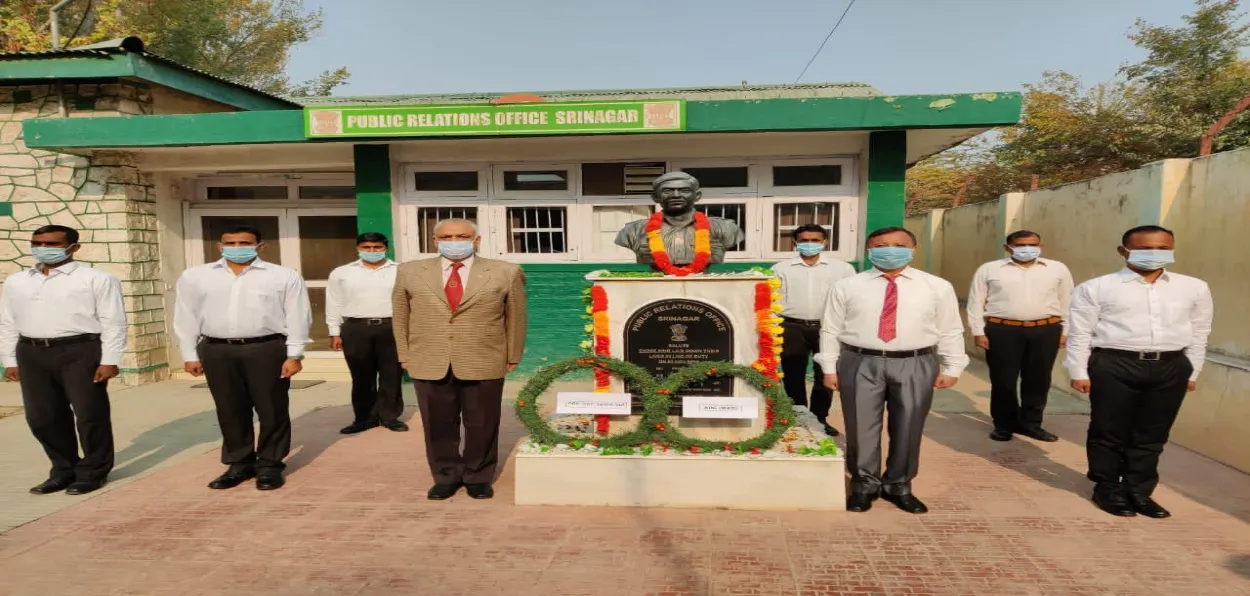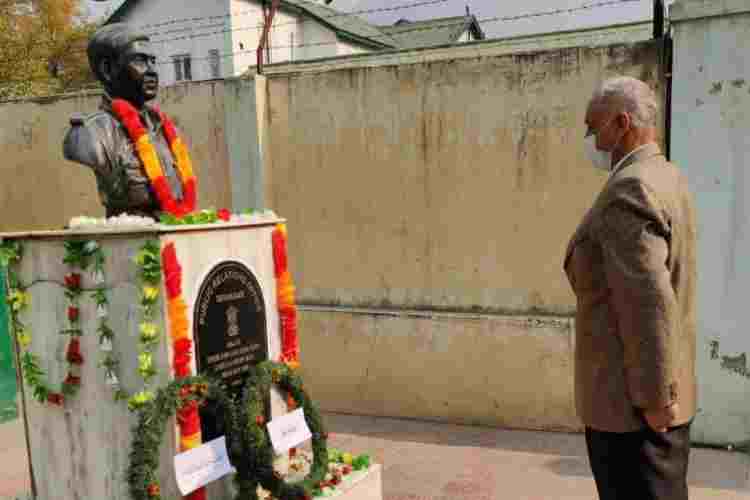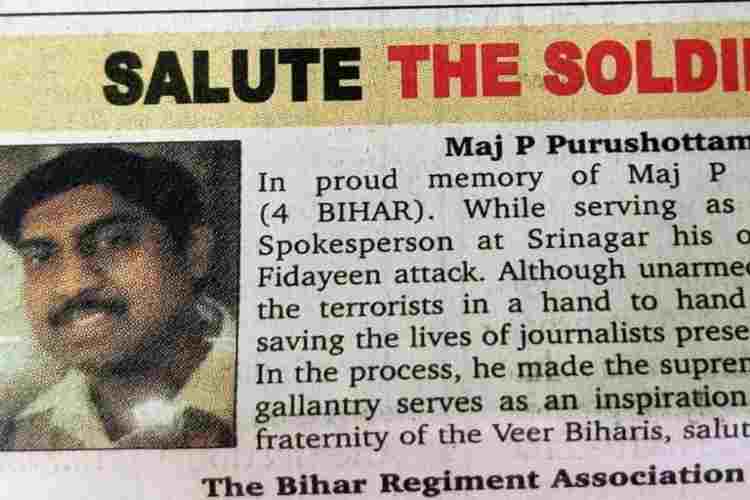
Festivals ignite nostalgia for joyous celebrations of one’s childhood, indulgent grandparents, generally parsimonious parents who do not mind spending on crackers, and the specter of sounds, lights, colours, and flavours of food. However, as we grow and connect with the real world, some not-so-joyous memories also become a part of us. One such memory is of Major Purushottam, who laid down his life in the line of duty saving media persons and preventing a bigger attack on the biggest army formations in Kashmir.
Major Purushottam was the Public Relations Officer (PRO) of the Army at the Badami Bagh Cantonment in Srinagar. A 4 Bihar regiment officer, Maj Purushotta was tall, handsome, and soft-spoken. He went out of his way to connect with the local media persons at a time when Pakistan-backed terrorism was at its peak and its propaganda machinery was in overdrive. Many journalists were suspected of having links with terrorists or under their influence and hence sometimes, the PROs were picky about doling out information.
Purushottam wanted – must have been instructed - to begin with a clean slate; not holding prejudices against anyone. Even against the advice of his friends, he visited the offices or residences of every journalist stationed in Srinagar to make initial contacts and build goodwill. His two-room office was the next building to the heavily guarded entrance gate of the BB Cantt. At any given time, it would be full of media persons seeking information in a place where the government lagged behind the pro-Pakistan apparatus in the dissemination of information.

Paying tributes to Maj Purushottam on his martyrdom anniversary
The Diwali of 1998 turned out to be my last Diwali in Srinagar and also one of the last meetings with Purushottam. He had invited all the journalists to the Diwali Mela held inside the sprawling Cantonment located in the foothills of Zabarvan. Visiting the fair was a luxury in Kashmir in those days when normalcy was a rarity and basic entertainment like cinema and dish TV was sinful under the command of the terrorists who dominated the social scene. Cinema halls were burned down and cable TV was banned.
I remember the day. The Zabarvan hill was drenched in autumn foilage – yellow, ochre, orange, and rust – and the sun shone brightly. I turned out in my desi avatar – with a sari and a bindi - to a warm welcome not only by Major Sahib but his young daughter Pallavi and wife Major Valsa, who was an Nursing officer in the BB cant hospital. He took a special interest in introducing all the journalists to his daughter, probably to make the young girl socialise and get familiar with etiquette of formal interaction. I already knew Maj Valsa who hailed from Kerala; we shared a bond because of our Kelera connection (My late husband was also a Malayayee).
Maj Purushottam was treating us –journalists – as family; he made sure each one of us - most of them Muslims – felt comfortable, shopped nicely, and participated in the games, etc. Puroshottam and his family made us feel at home. We ended the day with a visit to their beautiful home where we had a cup of Coffee. It was one of the most memorable and normal days of my decade-long tenure as a journalist in Kashmir. Yes, in a conflict situation, one misses on joys of normal life and it takes a toll on all living there.
Within a few months, I had moved out of Kashmir. I remember Purushottam and Valsa telling me they also would love to move out after finishing their tenures because of their daughter. Again, young parents working in conflict zones are worried about their children’s development in not-so-normal conditions. Maj Purushottam was also worried about the health of his frail-looking wife, not knowing that she was strong enough to face the coming upheaval in her life.
Purushottam was the only child of his parents who were Malayalees settled in Bhopal. He also invited journalists to meet his parents when they visited them.

A newspaper clipping: Colleagues remember Maj Purushottam
I had shifted to Delhi a few months ago when on the fateful day of 3 November, 1999, I came to know of the terrorist attack on Badami Bagh Cantonment. A Lashkar-e-toiba suicide bomber had blown himself into the entrance gate to deflect attention while his companions climbed the wall and entered the PRO's office.
The sound of the blast had alerted Purushottam and his staff. The first thing he did was to push three journalists who were present in his office into the washroom. As soon as he turned around, one terrorist shot him from point blank. All his staff died. The PRO's office took the brunt of the attack and in the meantime, the troops came in and eliminated the intruders.
The three Kashmiri journalists owe their lives to Major Purushottam.
I could catch an inconsolable Valsa and Pallavi at the New Delhi Railway station as they were boarding a train to Bhopal after the cremation. There was nothing to say; we both wept. I shudder to think of how Valsa, Purustomman's parents, and the spunky Pallavi managed life without his towering presence.
ALSO READ: Indian Muslims do not invest in Jihad, bloodshed: Khalid Jehangir
The story of Maj Purushottam is a typical story of a selfless Indian soldier – of the army or security forces. While I celebrate Diwali, I remember him and scores of other men who laid down their lives to ensure we all live in a free country and celebrate our Diwalis and Eids.
